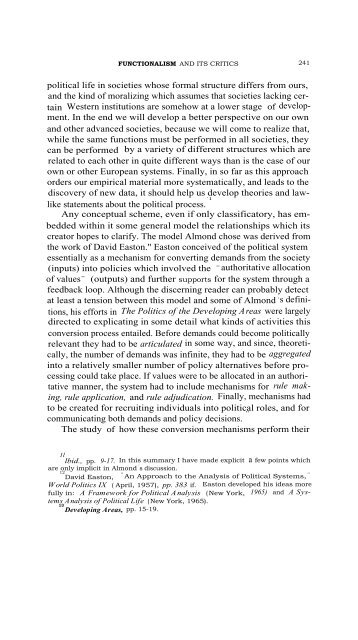FUNCTIONALISM AND ITS CRITICS - Intercollegiate Studies Institute
FUNCTIONALISM AND ITS CRITICS - Intercollegiate Studies Institute
FUNCTIONALISM AND ITS CRITICS - Intercollegiate Studies Institute
You also want an ePaper? Increase the reach of your titles
YUMPU automatically turns print PDFs into web optimized ePapers that Google loves.
<strong>FUNCTIONALISM</strong> <strong>AND</strong> <strong>ITS</strong> <strong>CRITICS</strong><br />
political life in societies whose formal structure differs from ours,<br />
and the kind of moralizing which assumes that societies lacking certain<br />
Western institutions are somehow at a lower stage of development.<br />
In the end we will develop a better perspective on our own<br />
and other advanced societies, because we will come to realize that,<br />
while the same functions must be performed in all societies, they<br />
can be performed ,by a variety of different structures which are<br />
related to each other in quite different ways than is the case of our<br />
own or other European systems. Finally, in so far as this approach<br />
orders our empirical material more systematically, and leads to the<br />
discovery of new data, it should help us develop theories and lawlike<br />
statements about the political process. '1<br />
Any conceptual scheme, even if only classificatory, has embedded<br />
within it some general model the relationships which its<br />
creator hopes to clarify. The model Almond chose was derived from<br />
the work of David Easton." Easton conceived of the political system<br />
essentially as a mechanism for converting demands from the society<br />
(inputs) into policies which involved the "authoritative allocation<br />
of values " (outputs) and further supports for the system through a<br />
feedback loop. Although the discerning reader can probably detect<br />
at least a tension between this model and some of Almond 's definitions,<br />
his efforts in The Politics of the Developing Areas were largely<br />
directed to explicating in some detail what kinds of activities this<br />
conversion process entailed. Before demands could become politically<br />
relevant they had to be articulated in some way, and since, theoretically,<br />
the number of demands was infinite, they had to be aggregated<br />
into a relatively smaller number of policy alternatives before processing<br />
could take place. If values were to be allocated in an authoritative<br />
manner, the system had to include mechanisms for rule making,<br />
rule application, and rule adjudication. Finally, mechanisms had<br />
to be created for recruiting individuals into political roles, and for<br />
communicating both demands and policy decisions. "<br />
The study of how these conversion mechanisms perform their<br />
1l<br />
lbid., pp. 9-17. In this summary I have made explicit a few points which<br />
are only implicit in Almond ' s discussion.<br />
12<br />
" "<br />
An Approach to the Analysis of Political Systems,<br />
David Easton,<br />
World Politics IX ( April, 1957), pp. 383 if. Easton developed his ideas more<br />
fully in: A Framework for Political Analysis (New York, 1965) and A Systems<br />
Analysis of Political Life ( New York, 1965).<br />
13<br />
Developing Areas, pp. 15-19.<br />
241
















